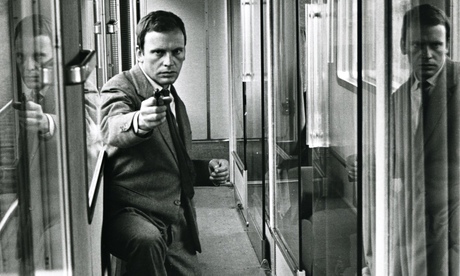
The "nouveau roman" was identified by the literary critic Emile Henriot in a 1957 Le Monde essay shortly before the oncoming "nouvelle vague" was heralded by Françoise Giroud in L'Express. Appropriately these latest fashions in literature and cinema were brought together when Alain Resnais made his entry into feature films with intriguingly enigmatic pictures based on original screenplays by two leading exponents of the "new novel": Marguerite Duras's Hiroshima mon amour (1959) and Alain Robbe-Grillet's L'année dernière à Marienbad (1961). Both Duras and Robbe-Grillet went on to produce sizeable bodies of work as writer-directors with texts that in varying degrees abandoned traditional ideas about character, narrative and linearity, though neither perhaps made a single picture as convincing as their collaborations with Resnais.
Robbe-Grillet (1922-2008) directed nine movies, six of them on this box set, of which the first three, L'Immortelle (1963), Trans-Europ-Express (1967) and L'Homme qui ment (1968) are the most original and engaging. Set in Istanbul, L'Immortelle's passive protagonist (played by Jacques Doniol-Valcroze, co-founder of Cahiers du cinèma) is obsessed with a beautiful woman he follows from ferry to ferry, mosque to mosque and hotel to hotel around the Bosphorus. She may have been killed in a car crash or might be part of a criminal conspiracy. Nothing is definitely stated, scenes are constantly repeated, the soundtrack is curiously distorted, the images limpid and exotic.
Like L'Immortelle, Trans-Europ-Express is superbly lit by Willy Kurant who'd worked with Agnès Varda and Jean-Luc Godard. It's a playful exercise in which Robbe-Grillet, his producer and a secretary write and rewrite a thriller on a train from Paris to Antwerp, the putative anti-hero being Elias, played in this first of three Robbe-Grillet films by the key nouvelle vague star Jean-Louis Trintignant. Is he a drug dealer or a diamond thief? Is he merely Robbe-Grillet's puppet? It's a clever, ludic work, and most of the activity between Elias and a Belgian prostitute is of a sadomasochistic kind that becomes increasingly obsessive in the subsequent films and was to result in widespread censorship that made his pictures difficult to find in uncut versions. Sadomasochism was far more than a passing interest on Robbe-Grillet's part.

